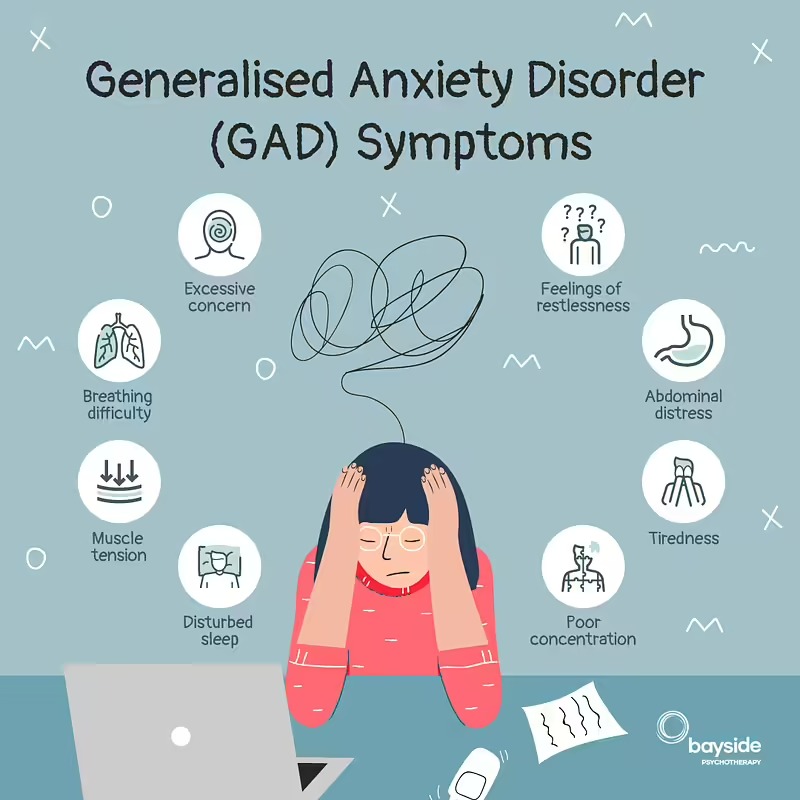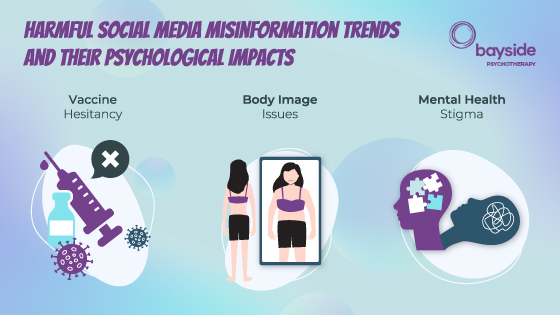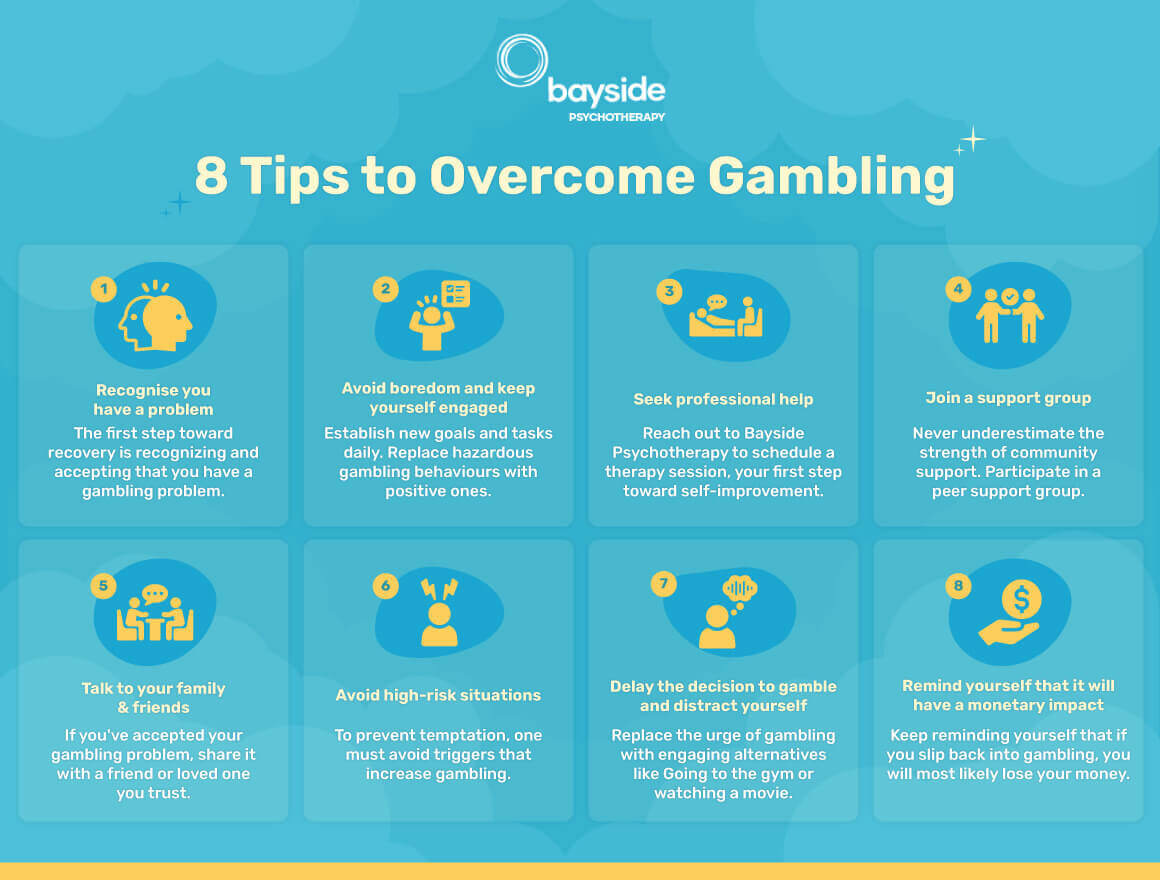The Balance of Power in Romantic Relationships: How Healthy Relationships Thrive on Equality
Why do some relationships thrive while others feel like a constant tug-of-war? Power dynamics lie at the heart of this balance, shaping everything from small decisions to long-term happiness. In healthy relationships, power is shared and balanced, fostering mutual respect, understanding, and equality.
When it’s not, control, manipulation, and dependence can creep in— creating tension, resentment, and emotional strain.
In today’s digital age, terms like ‘narcissist’ and ‘gaslighting’ have become ubiquitous on social media. While these terms can help victims articulate genuine experiences of abuse, it’s essential not to conflate toxic behaviour with everyday disagreements. Although these words are valuable for identifying toxic or abusive behaviour, their frequent and casual use to describe common disagreements or personality clashes can dilute their meaning. It’s important to differentiate between behaviours that signal a toxic power dynamic and those that may simply reflect individual differences or situational misunderstandings. Understanding power dynamics is crucial for building trust, maintaining harmony, and ensuring that both partners feel valued and supported. Understanding each other and acting as a team, is important for a long-lasting relationship – especially when faced with additional challenges.
Types of Power in Romantic and Marriage Relationships
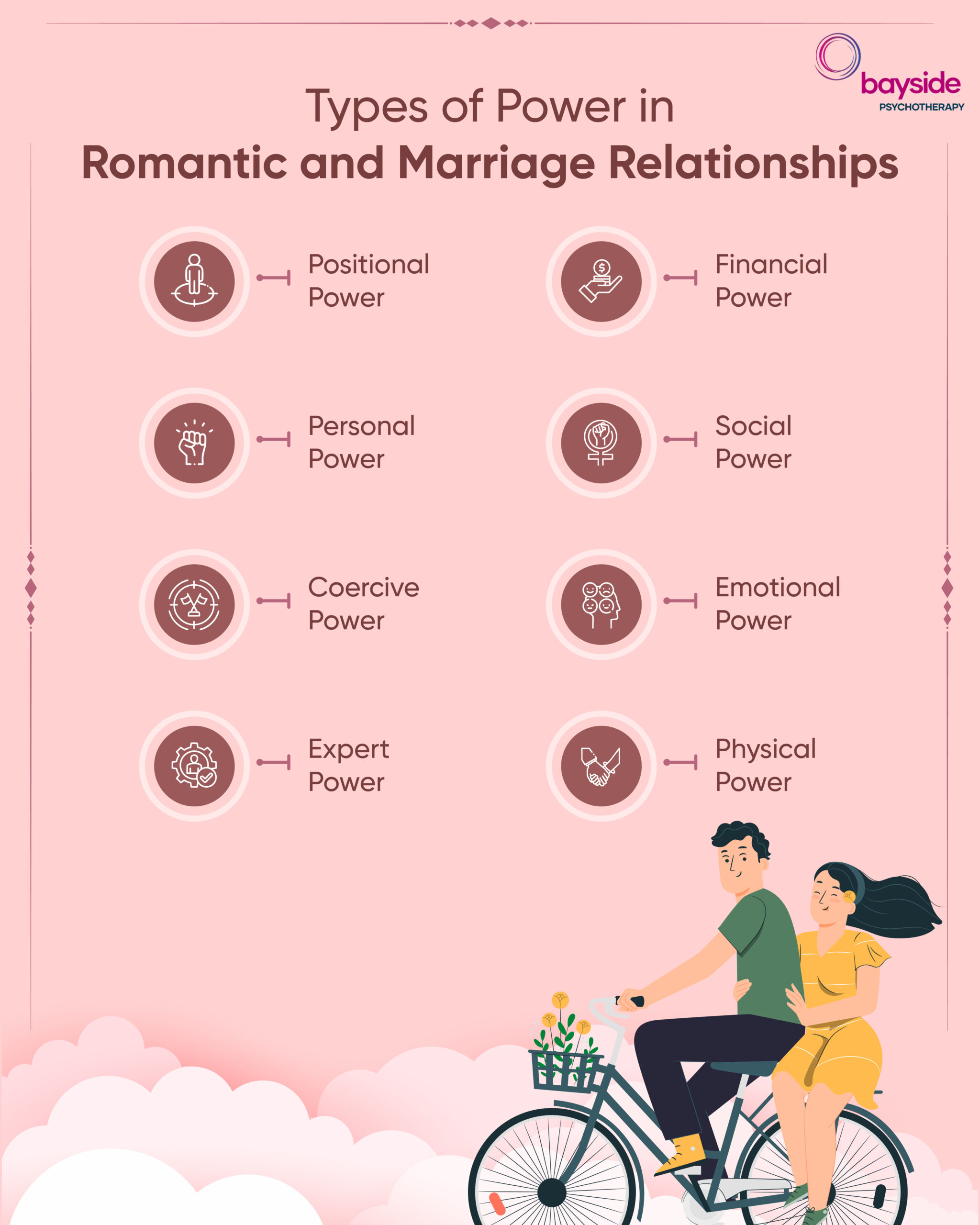
Power can present in different forms, and the form of power can affect how partners interact and make decisions. Understanding these types of power roles is important for any relationship.
Positional Power
Partners naturally take on different roles within a relationship. Healthy relationships share these responsibilities and appreciate the other’s value – whether it’s managing the finances, doing the grocery shopping, mowing the lawns or picking the kids up from school.
When one partner dominates these roles, resentment can grow. When one partner makes all the decisions, the other may begin to feel powerless and unvalued.
An article from The Daily Telegraph discusses a common dynamic where one partner assumes the role of the “Tour Guide,” responsible for planning and organising activities, while the other becomes the “Tourist,” who is more passive. This division of labour can lead to one partner feeling burdened and resentful. Clinical psychologist Dr. Lillian Nejad suggests sharing tasks to reduce the mental load and ensure both partners can enjoy shared experiences (The Daily Telegraph).
Personal Power
Some people are natural communicators. They interact with others confidently and can express emotions more easily. While these traits are valuable, partners are encouraged to consciously check in with each other to ensure that quieter voices are heard, fostering a space where both feel respected Strong personalities can inadvertently dominate conversations about everything from weekend plans to buying a house. Balance requires conscious effort to ensure that both voices carry equal weight.
Economic/Financial Power
Money matters are a common point of tension in Australian households. Recently released research has shown that four out of ten Australians in a relationship have experienced financial stress this year. Almost half of these reported that this had a negative impact on their relationship (The Property Tribune).
Whether managing mortgage payments, investment properties, or daily expenses, financial power needs to be carefully balanced. One partner controlling all the money decisions often leads to a relationship breakdown.
Coercive Power
Coercive power is a serious form of relationship abuse that has recently been criminalised in several Australian states. Preliminary data from the NSW Bureau of Crime Statistics and Research (BOCSAR) indicates that in the initial two months following the law’s implementation, 56 incidents of coercive control were recorded by NSW Police (NSW Bureau of Crime Statistics and Research).
Coercive control involves a pattern of behaviour that can strip away a partner’s sense of freedom and ability to do things for themself.
Common signs include:
- Controlling daily activities and routines
- Monitoring communication with family and friends
- Making threats about children, pets, property
- Threatening self-harm or physical harm to others
- Controlling access to money
- Using technology to track
- Gaslighting or manipulation
- Setting rigid rules and expectations
- Making threats around visas or deportation
The impact of coercive control can be devastating, often leaving lasting psychological trauma. Many victims don’t recognise these behaviours as abuse initially, as they can build gradually over time.
If you’re experiencing any form of coercive control, it’s important to know that support is available through domestic violence services and women’s legal services across Australia. If you are in doubt about your safety, contact the police immediately or reach out to the Orange Door for confidential support and guidance.
Expert Knowledge
Each partner brings unique skills to the table. From property investment knowledge to parenting experience. Valuing each partners’ expertise equally is crucial to maintaining relationship balance. This might mean one partner handles the car maintenance while the other may make sure the bills are paid on time. Major decisions, on the other hand, should still be shared.
Emotional Power
Emotional power in relationships can be subtle but deeply impactful. The Australian Bureau of Statistics (ABS) reports that approximately 3.6 million Australians have experienced emotional abuse by a partner since the age of 15 (ABS).
It can manifest through:
- Withholding affection or attention as punishment
- Using emotional vulnerability against a partner
- Making a partner feel responsible for their emotional state
- Emotional blackmail
- Using past traumas to manipulate current situations
- Unpredictable mood swings that control a partner’s behaviour.
Healthy emotional dynamics on the other hand involve mutual emotional support and respect for each other’s feelings. When one partner decides which issues are more important in silo, their partner may have a different perspective. Such gaps are normal but have potential to rupture the relationship and tilt power differentials in a toxic way unless handled with respect for the others perspective and values.
Physical Power
Physical power dynamics extend beyond obvious forms of physical abuse. They include:
- Intimidating body language
- Using size or strength to dominate
- Blocking doorways during arguments
- Controlling sleep or rest
- Breaking or throwing objects
- Threatening physical harm to others
- Aggressive driving or dangerous behaviour
Warning Signs of Unhealthy Power Dynamics
According to Adam Szmerling, Mental Health Social Worker & Psychoanalytic Psychotherapist at Bayside Psychotherapy, “One of the clearest signs is making excuses for mistreatment— habitually minimising or justifying harmful behaviour.
Another critical indicator is a lack of reciprocity. When one partner consistently prioritises their needs or dismisses the other’s input, it can signal an imbalance of power. However, this doesn’t mean keeping score or expecting perfect equality in every moment, but rather maintaining a balance where both partners feel their contributions are valued. Mutual respect is a crucial factor in a healthy relationship, for ones own emotions and thoughts and of their partners. Lack of consideration and a partner refusing to take responsibility and ownership for their actions and seeking to constantly blame, externalise and not apologise for hurtful words and actions are red flags.”
Decision-Making Red Flags
- One partner makes all major decisions without consulting the other
- Discussions about money often ends in arguments or silence
- Important choices often happen without mutual agreement
- Social activities are controlled by one partner
- Using guilt to control decisions (“you would do it if you loved me…, etc.,)
Communication Red Flags
- Silent treatment after disagreements (stonewalling)
- Dismissing partner’s opinions as unimportant
- Constant criticism of choices or actions
- Keeping score and using their partner’s vulnerabilities as punishment
- Making threats
- Using children or finances as leverage
Support Imbalance
- One partner provides all the emotional support
- One partner does all the daily tasks
- One partner’s career takes constant priority
- Social and family relationships become one-sided
Restoring Balance in Relationships
Restoring balance in a relationship requires self-awareness, mutual effort, and a commitment to fairness.
According to Adam Szmerling, “Understand that the road to hell is paved with good intentions. What you assume, based on your beliefs and efforts, “should” make your partner feel equal and valued may not align with their needs. Always listen carefully, reflect on what you hear to confirm your understanding, and assert your own needs and boundaries equally.
For example, if your partner voices frustration, instead of reacting defensively, you could say: ‘It sounds like you’re feeling unheard about [specific issue]. Is that correct?’ This implies clarity and mutual respect.” Here’s how to address and restore balance:
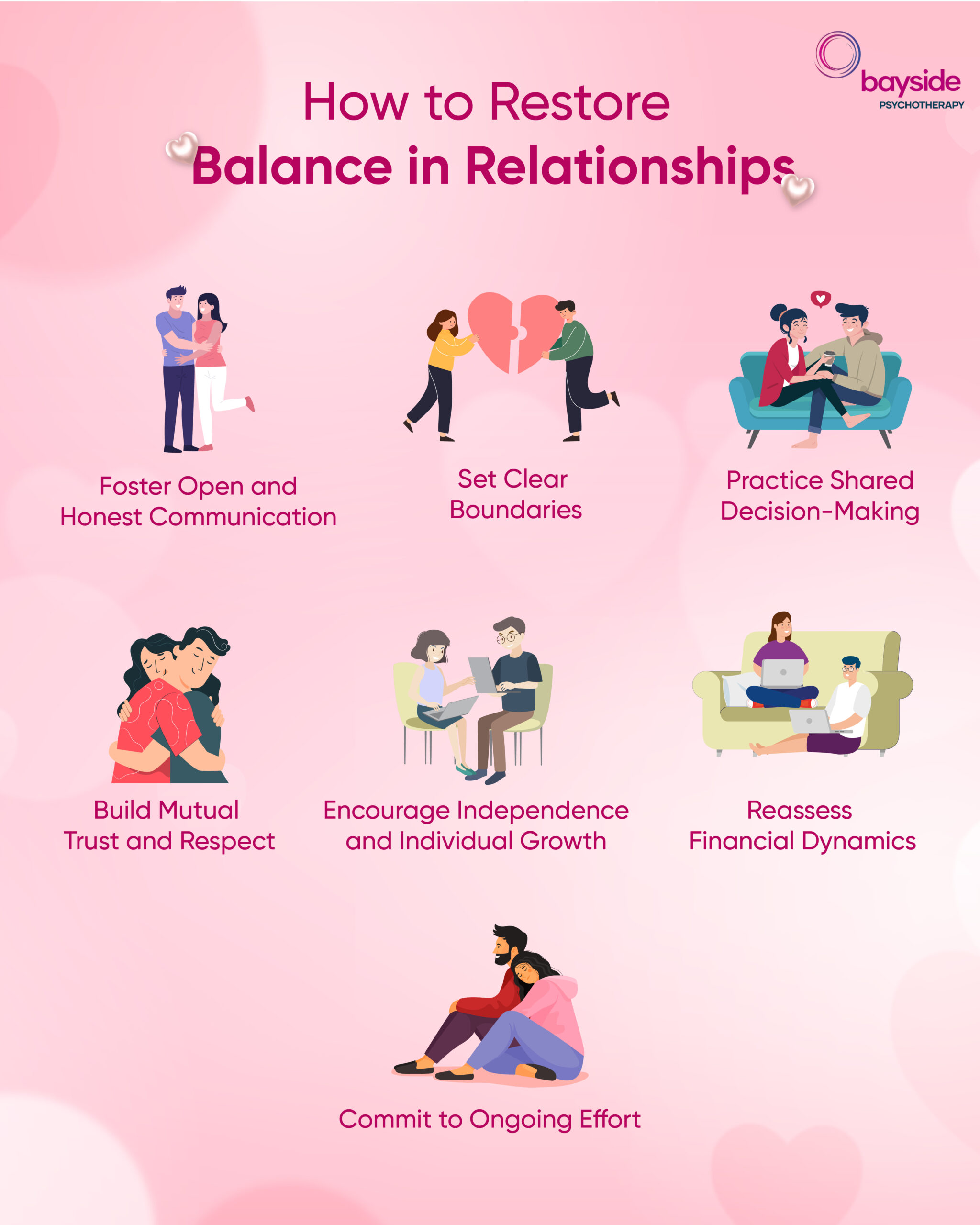
Practical Steps:
- Schedule weekly relationship check-ins
- Review the decisions that were made in the week
- Plan upcoming events together
- Discuss any issues that arose during the week
Carolina Rosa, Hypnotherapist & Counsellor at Bayside Psychotherapy suggests, “I would say that the single most important thing would be support. Support can come in many forms. Emotional support. This can be believing in the other person, when they lose faith in themselves. Uplifting the other. Rejoicing in their wins. Listening and caring with an open mind rather than judgement. Physical support, by helping the other achieve a goal or lending a hand when they’re struggling to do it alone and doing this even when you’re tired or have better things to do.”
- Be open and honest about finances
- Collaborate on financial planning by openly discussing major purchases and shared goals, ensuring both partners are involved
- Review financial goals, together
- Listen to your partners fears and goals with curiosity even if they don’t align with your own
According to Sara Herring, Hypnotherapist & Counsellor at Bayside Psychotherapy, “I believe that the single most important tip to build a healthy power dynamic in a relationship is open and honest communication, to create trust and understanding. If there is manipulation by one person using verbal abuse, gaslighting or other tactics to control the other, then there is no trust and this creates an imbalance in the relationship along with resentment.”
- Share the decision making on major life choices such as:
- Housing choices
- Career changes
- Holiday planning
- Investment strategies
- Family Matters
Kelli Tranter, Hypnotherapist & Counsellor at Bayside Psychotherapy suggests, “It’s essential for both partners to feel safe with each other to express their needs and concerns. Open communication, empathy, and a willingness to listen and address issues together are key to building and maintaining a healthy power dynamic in the relationship. If one partner consistently dismisses the other’s needs or feelings and responds with avoidant or blaming behaviour when concerns are raised, this is an important sign that something is awry and outside support might be needed to address the issue.”
- Divide household responsibilities
- Have a task list if necessary
- Rotate duties where necessary
- Acknowledge each other’s contributions
- Don’t keep score and use criticism to effect behavioural change
- Focus on appreciation balancing empathy with assertiveness when making requests.
When to Seek Professional Help
Power dynamics are an inevitable part of any relationship, but how they are managed determines the health and longevity of the partnership.
Consider relationship counselling if:
- Power imbalances persist despite discussions
- Arguments about control happen often and are unresolvable
- Financial decisions cause regular conflict
- Communication breakdowns happen often
- One partner feels constantly dismissed or unheard
Restoring balance isn’t always easy, and it often requires honest self-reflection, patience, and effort from both individuals. However, when handled with care and intention, these changes can pave the way for a more harmonious and fulfilling relationship.
Relationship counsellors and therapists provide a neutral space to explore dynamics, identify challenges, and develop actionable strategies for improvement.
Remember, healthy relationships require equal power sharing. If you’re struggling with relationship power dynamics, professional couple counselling support is readily available.
Need relationship support? Book an online or an in-person session at Bayside Psychotherapy Melbourne.
Here are a couple of blogs written on this topic you might find useful:
Choosing the right therapist: The 5 mo...
Choosing the right therapist can be difficult. Different problems and diff.
The Dark Side of Social Media: How Mis...
Ever find yourself scrolling mindlessly on your phone, only to realise the hours have slipped away? You’re not alone. For man.
Creating Healthier Workspaces: How str...
Employee mental health is pivotal to overall workplace wellbeing, impacting individual performance, job satisfaction, and organ.
From High Stakes to Healing: 8 Tips To...
Gambling activities have become more accessible and convenient due to the proliferation of casinos and the rapid growth of online gambling platforms. Mo.







